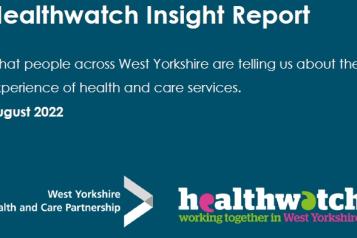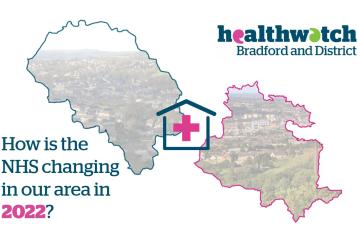New era for health and care in Bradford district as West Yorkshire Integrated Care Board starts work

At the start of July 2022, the NHS West Yorkshire Integrated Care Board (ICB) took over from Bradford and Craven Clinical Commissioning Group (CCG) as the body responsible for planning services for the district.
The change, delayed from April, It is part of new legislation set out in the Health and Care Act 2022, which focuses on improving outcomes for people by addressing health inequalities, the difference in care received and effective use of budgets across the area.
Clinical commissioning groups, which have had control of local budgets until now, have been abolished as part of the reforms. The Integrated Care Board will employ former CCG staff who work for the NHS locally or on West Yorkshire programmes such as cancer, mental health, urgent emergency care and health inequalities.
The organisation will be led by Chief Executive Rob Webster CBE and an independent Chair, Cathy Elliott.
The Board of the Integrated Care Board will have four non-executive members. Together with Healthwatch, these members will ensure a strong independent voice and help to make sure the views of local people are heard.
Local decisions
The Integrated Care Board, which is part of West Yorkshire Health and Care Partnership, will agree a plan for health and care services in West Yorkshire. Most decisions about the circa £5 billion budget and services delivered will be made locally in five local "places", one of which is Bradford and Craven (Bradford District and Craven Health and Care Partnership).
At the meeting, five new priority areas were discussed - children and young people, mental health and learning disabilities and neuro-diversity, resilient communities, access to care and workforce development.
The West Yorkshire ICB Board also includes members from the five local places (also including Leeds, Kirklees, Calderdale and Wakefield) and includes ICB Directors for Finance, Nursing, People, a Medical Director and a Director of Strategy and Partnerships. Board members also include representation from:
- NHS acute hospitals
- Mental health, learning disability and autism providers
- Community health service providers
- Directors of public health
- Local councils
- Primary care providers
- Voluntary, community and social enterprises.
Joining up health and care services
As outlined by Healthwatch Bradford and District last year, the ICB brings together hospitals and community providers, primary care (such as GP practices and pharmacies), local councils, hospitals, voluntary organisations and Healthwatch to make sure people living in our area get the best start in life and are able to remain healthy and age well by:
- joining up health and care services
- improving people’s health and wellbeing
- reducing health inequalities.
It will be responsible for a population of 2.4 million people in Bradford and Craven, Leeds, Kirklees, Calderdale and Wakefield, 20 per cent of whom are from minority ethnic communities. The 2.4 million people include:
- 315,000 unpaid carers
- 570,000 children and young people
- 500,000 people living in areas ranked in the most deprived 10 per cent of England.
Your feedback making a difference
Rob Webster CBE said: "These arrangements are designed to drive collaboration between all of the partners in health and care. They recognise that the NHS can only succeed if it works with citizens, councils, charities, and other organisations in pursuit of improved outcomes, particularly for those in our poorer communities.
"This Partnership has already shown it can make a difference and the ICB is another step towards cementing this way of working in collaboration as we address the impact of the last two years on staff, services and citizens."
Louise Ansari, national director at Healthwatch England, said: “The introduction of Integrated Care Systems gives us a unique chance to feed people’s views into the planning and running of services. For instance, we know there’s a desire among the public to see services closer to where people live, making them more accessible and truly at the heart of communities. When services act on the experiences of those they serve, it results in better care.
“We are committed to playing our part, helping create a true partnership between services and the public. A partnership where communities are represented at every level of decision-making, those facing the greatest inequalities are heard and there is an ongoing conversation about how we can make care better together.”
Helen Rushworth, Lead Officer for Healthwatch Bradford and District, said: "Over the past year, Healthwatch Bradford and District has been heavily involved in planning the new system. As these new bodies have been conceived and developed, we represented all local Healthwatch across West Yorkshire on the Governance group, ensuring that listening to – and acting upon – the voice of people using health and care services is hardwired into the DNA of the new structures that have been put in place.
"The new Place-based committees will replace local CCGs, and for the first time we will hold voting rights at this table. All of these positions provide routes for us to channel the stories and issues people are telling us about directly to the heart of those bodies able to make a difference.
"The new citizen’s panel, whose development is led by Healthwatch Bradford and District, will be an independent consultative body advising and influencing health and social care in our area.
"Thanks to our close relationships with our Healthwatch colleagues across the region, we have been able to form a devolved Healthwatch leadership team within the ICB. Bradford takes the lead on the Quality Committee, but Healthwatch is involved at all appropriate committees and has a dedicated seat on the ICB."

